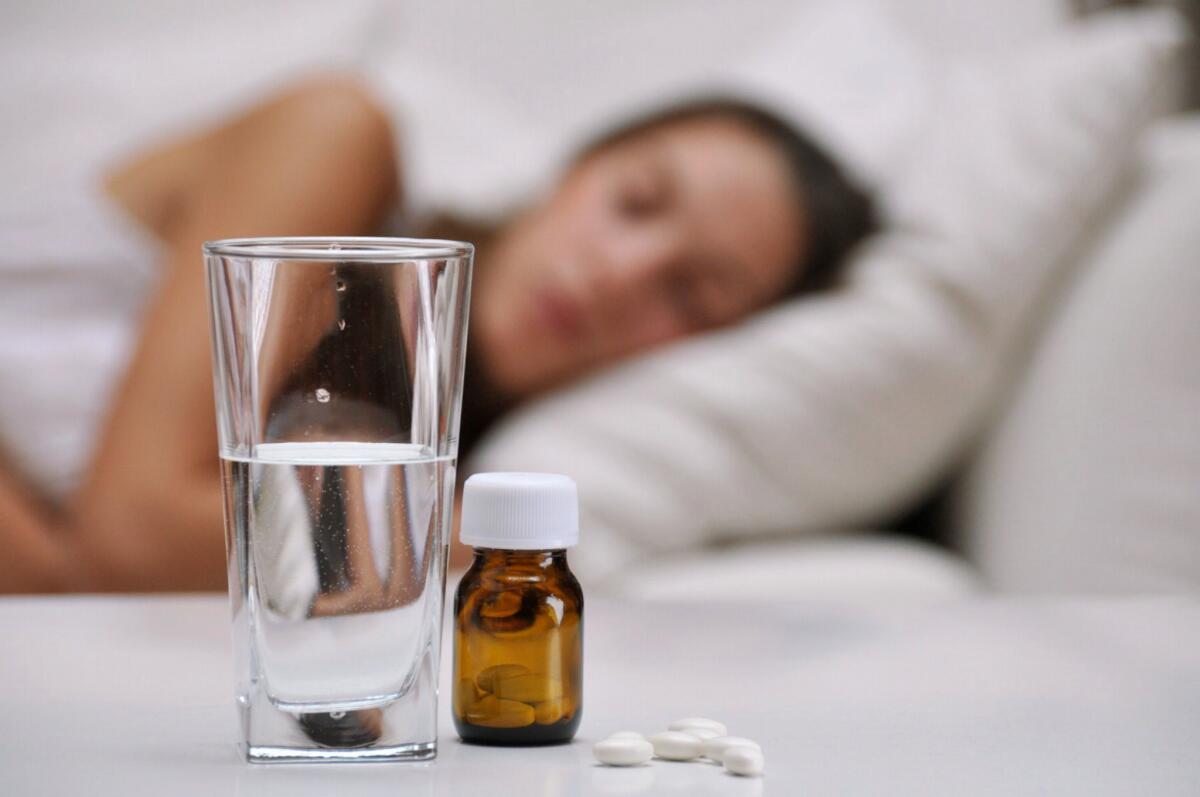The answer to your sleep problems probably isn’t found in a pill bottle

Americans are obsessed with getting more sleep -- and are turning to pharmaceutical shortcuts to help them.
There was good news last week for people who struggle to get eight hours of sleep a night: They may not need so much shut-eye after all.
And that’s bad news for the multibillion-dollar sleeping pill industry.
Researchers from UCLA and elsewhere looked at sleep habits of remote hunter-gatherers in Tanzania, Namibia and Bolivia — groups with preindustrial lifestyles whose sleep patterns are believed to reflect those of ancient humans.
The researchers found that, on average, members of each group sleep a bit less than six and a half hours a night. They’re not even napping to catch some Zs on the sly.
The study, published in the academic journal Current Biology, indicates that “natural” sleep is less than eight hours a night and that modern society’s myriad electronic distractions aren’t necessarily to blame for people getting just six or seven hours of slumber.
“This has important implications for the idea that we need to take sleeping pills because sleep has been reduced from its natural level by the widespread use of electricity, TV, the Internet and so on,” said Jerome Siegel, director of UCLA’s Center for Sleep Research.
“The story that often gets out is that if you sleep for less than seven hours, you’re going to die early,” he told me. “That’s not true.”
Yet Americans are obsessed with getting more sleep — and on turning to pharmaceutical shortcuts to help them.
According to the Centers for Disease Control, as many as 70 million U.S. adults suffer from sleep disorders or sleep deprivation. Only a third of Americans get the government’s recommended seven to nine hours of sleep a night.
About 9 million American adults use prescription sleeping pills to help get a decent night’s rest, the CDC found.
Those stats are from a 2013 report. Siegel said the number of people relying on meds “has gone up rather rapidly since then.”
That means big bucks for Big Pharma. Industry consulting firm GlobalData estimates that worldwide sales for insomnia meds will run about $1.4 billion next year and reach $1.8 billion by 2023, rebounding from lower sales in recent years because of cheaper generics hitting the market.
The industry is being energized by the introduction of Merck’s new pill, Belsomra, which is touted as having more beneficial effects than other insomnia meds such as Ambien and Lunesta.
While most other pills act on brain pathways that put people to sleep, Belsomra works differently. It blocks so-called orexins, which are brain chemicals that keep people awake.
But Consumer Reports, for one, is warning the sleep-challenged to steer clear of Belsomra.
“It might help you nod off a few minutes faster or stay asleep slightly longer,” the magazine said. “But that small benefit comes with some big safety concerns, such as being too drowsy to drive the next day or feeling like you can’t move or talk.”
Consumer Reports said its analysis of Belsomra found that people who took a 15- or 20-miligram dose every night for three months fell asleep just six minutes faster on average than those who took a placebo. The Belsomra group slept only 16 minutes longer than the placebo group, the study found.
Dr. Joseph Herring, executive director of clinical neuroscience for Merck Research Laboratories, said analyses such as the one performed by Consumer Reports are misleading because they overlook individual results.
“What you want to know from a patient perspective is if they haven’t been taking a sleep medication and start taking one, what happens?” he said.
Herring said sleeping pills should be part of the “overall treatment” of sleep disorders.
GlobalData estimates that sales of Belsomra will reach $458 million within eight years.
Dr. Roy Artal, a sleep specialist in West Los Angeles, said it’s understandable that busy people in today’s go-go world would turn to prescription meds to hasten the sleep process. But all they’re doing is building a reliance on powerful drugs for relatively little improvement.
“There’s no magic pill that makes us sleep when we want and wake up when we want,” Artal said. “The effects of sleeping pills tend to be modest.”
He and other experts say the answer to sleeplessness isn’t to be found in a pill bottle. It’s in what’s called “sleep hygiene.”
Here are four steps that the National Sleep Foundation recommends as the basis of good sleep hygiene:
•Try to go to bed at the same time each night and get up at the same time each morning. Your body will adjust to the regular cycle.
•Keep your bedroom dark, quiet and relaxing. This helps make a smooth transition from wakefulness to Lullaby Land.
•Ditch the devices. No TVs, computers, tablets or smartphones in the bedroom. These things have a stimulative effect and make it harder to fall asleep.
•Avoid large meals before bedtime. Also, stay away from stimulants such as coffee, nicotine and alcohol as bedtime approaches. A glass of wine might help you nod off, but you’ll regret it later when your body starts metabolizing the alcohol, which could wake you up.
Your sleep hygiene probably needs some work if you find that you tend to be restless in bed or are drowsy during the day. The most important thing is to find what works for you.
“Being anxious about not sleeping is part of the problem,” UCLA’s Siegel said. “Worrying about sleep is not a good way to get to sleep.”
Our ancient ancestors seemed to get that. Probably wouldn’t hurt to follow their example.
David Lazarus’ column runs Tuesdays and Fridays. He also can be seen daily on KTLA-TV Channel 5 and followed on Twitter @Davidlaz. Send your tips or feedback to [email protected].
More to Read
Inside the business of entertainment
The Wide Shot brings you news, analysis and insights on everything from streaming wars to production — and what it all means for the future.
You may occasionally receive promotional content from the Los Angeles Times.











